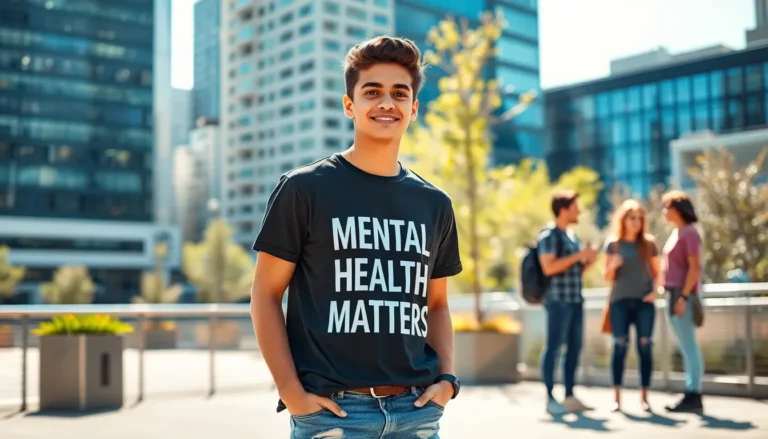Table of Contents
ToggleLet’s get real for a second: mental health is like that popular kid in school everyone wants to hang out with but is often ignored. The truth? It matters, like, a lot. Just as you wouldn’t drive a car on empty or eat soup straight from a can without heating it (please don’t), you shouldn’t overlook your mental well-being. So, grab a comfy seat, maybe a snack, and let’s jump into why your mental health matters more than ever.
Understanding Mental Health

Mental health refers to our emotional, psychological, and social well-being. It isn’t just about avoiding disorders: it’s about living a fulfilled life. Understanding mental health involves four key areas: how we think, feel, act, and relate to others. In simpler terms, it’s the glue that holds our psychological and emotional well-being together.
Everyone has mental health, just as they have physical health. It can fluctuate depending on various life circumstances. Factors like stress, relationships, and work can either bolster or detract from one’s mental health. Grasping this concept lays the foundation for recognizing why mental health should be a priority, not an afterthought.
Mental health also plays a role in how we cope with life’s challenges. Those equipped with strong mental health skills can deal with life’s ups and downs more effectively, leading to more positive outcomes. So, remember, mental health isn’t just about mood swings: it’s about your entire experience of life.
The Importance of Mental Health
Recognizing the importance of mental health is akin to knowing the benefits of regular exercise or drinking enough water. Just as skipping workouts affects physical fitness, neglecting mental health impedes overall life quality. Healthy mental states allow individuals to realize their potential, work productively, and contribute to their communities.
Also, mental health directly influences physical health. Studies show a strong connection between mental well-being and various physical ailments, including heart disease and high blood pressure. When people prioritize their mental health, they often experience improved physical conditions. Investing time and resources in mental health care isn’t just a luxury: it’s a necessity for living a balanced life.
The ripple effect is profound. When one person manages their mental health well, it has a positive impact on others, family, friends, colleagues. Essentially, a mentally healthy society is a more compassionate and productive one.
Common Mental Health Issues
While mental health can encompass a wide variety of experiences, there are some common issues that many people face. Anxiety, depression, and obsessive-compulsive disorder rank among the most prevalent conditions. Each of these disorders has its own unique symptoms and challenges.
Signs That You May Need Support
Not sure if you might need a helping hand? Here are some common signs:
- Constant Worry: If you find yourself stressing about everyday situations, it might be time to reflect on your mental state.
- Changes in Mood: Experiencing emotional swings more frequently can indicate underlying issues.
- Withdrawal: If social interactions start feeling overwhelming or uninteresting, that’s a red flag.
- Difficulty Concentrating: Struggling to focus on tasks you usually enjoy could suggest that something is amiss.
- Changes in Sleep Patterns: Trouble sleeping or sleeping too much can often signify mental distress.
These signs are not absolute indicators that someone suffers from a mental health issue, but they are important signals. Recognizing them can lead to the essential steps to recovery.
Breaking the Stigma Surrounding Mental Health
Even though growing awareness, stigma around mental health still thrives in many societies. Negative stereotypes can make individuals hesitant to seek help or even talk about their struggles. This stigma often stems from a lack of understanding and education about mental health issues.
Breaking down these barriers starts with conversation. Open discussions help demystify mental health, making it easier for those suffering to seek support without feeling isolated or judged. By sharing stories and experiences, communities can dismantle stereotypes and foster acceptance.
Famous figures speaking out about their battles with mental health, like athletes or entertainers, play a crucial role in this conversation. Their visibility helps normalize mental health discussions and encourages more individuals to share their own experiences.
Practical Strategies for Better Mental Health
Improving mental health doesn’t happen overnight: it often takes a series of small, dedicated efforts. Here are some practical strategies anyone can employ:
- Stay Active: Physical exercise isn’t just for body fitness. Exercise releases endorphins, which are natural mood lifters. Regular workouts can significantly enhance mental well-being.
- Connect with Others: Human connection is crucial. Spend time with friends, family, or pets. Building these relationships can create a support system.
- Practice Mindfulness: Techniques like yoga or meditation can help ground individuals and reduce anxiety. These practices promote presence and have lasting positive effects on mental health.
- Establish a Routine: A consistent daily schedule can create a sense of normalcy and help alleviate feelings of chaos.
- Limit Screen Time: While technology is essential, excessive use can lead to anxiety and depression. Aim for occasional digital detoxes to reconnect with the world around you.
Implementing even a few of these strategies can lead to noticeable changes in one’s outlook and emotional resilience.
When to Seek Professional Help
Deciding to seek professional help can be daunting but can also be the best step toward recovery. Generally, one should consider reaching out to a mental health professional when:
-Daily life is consistently being affected by emotional struggles.
-You notice recurring patterns of distress or unhealthy coping mechanisms.
-You feel overwhelmed even though trying self-help strategies.
-You experience thoughts of self-harm or a lack of desire to continue.
Therapy can provide a safe space for individuals to explore their feelings and thoughts. Mental health professionals can offer personalized strategies, coping mechanisms, and guidance that empower individuals to navigate their mental health journey effectively.




